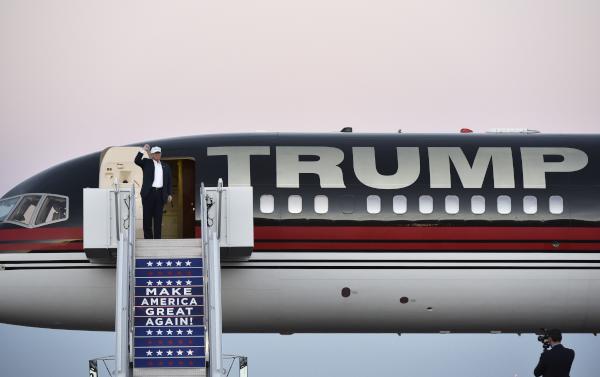Extremist forces in our region have declared war on the US President-elect Donald Trump even before he has entered the White House under the pretext that he has an agenda to fight Islam and Muslims. They are trying to incite around one billion Muslims around the world against the new administration and the United States. Religious pulpits and media affiliated to extremist Islamic organisations including the Muslim Brotherhood and the Iranian regime are being used to do this.
Is President-elect Trump really hostile to Muslims in general? Do his secretaries of state really hold hostile positions against Islam as a religion? Since the US President-elect’s choices for his cabinet have been made public, a campaign has started in our region that relies on articles and video clips attributed to members of Trump’s new cabinet, and declares that there are preparations to fight a war on a billion Muslims in Washington. Trump’s Defence Secretary General James Mattis has voiced hostility clearly, but against terrorist organisations such as Al-Qaeda. He is also explicitly against what Iran is doing in Iran, Syria and Lebanon. Trump’s National Security Adviser General Michael Flynn has made fierce speeches against extremist Islamist groups and many have used these speeches to indicate that he is hostile to Islam and Muslims.
In fact, what General Flynn said is what we keep on saying to ourselves – that there is a dangerous virus within the Muslim community called extremism that is killing Muslims and threatening them everywhere, more than it is harming the west and followers of other religions. Doesn’t this dangerous disease exist in Muslim societies around the world? Of course it does. Look at what happened in Turkey and Egypt during the last few days, and the heinous crimes that extremists groups that Flynn and Mattis demand to confront have committed in Saudi Arabia, Morocco and Jordan.
Trump chose Mike Pompeo to be director of the Central Intelligence Agency (CIA), and he has the same views on the need to confront extremism and is aware of the destructive role that Iran plays in the region and the world.
If we realise that those who are angry with these three appointments are Iran, Al-Qaeda and Islamist groups like the Muslim Brotherhood, we will be able to understand that the problem does not lie in Trump’s choices but in the project of these men to confront terrorism that these parties sponsor or benefit from. The majority of Islamic countries agree with the proposals of these secretaries of state and their view of the crisis that threatens the whole world.
We, as Muslims, have been fighting a war against extremism and extremist ideology and groups for the last fifteen years, and we want the world to differentiate between Muslims and not generalise. We want the world to stand with the majority of peaceful Muslims against the evil minority. It is in our interest to repel regimes, such as Iran, that support terrorist groups, whether Sunni or Shiite, and those that become their allies and intervene in regional wars under false slogans such as defending Islam or standing against the west.
On the other hand, we understand that Hillary Clinton’s defeat in the election angered the Muslim Brotherhood, and their outrage was intensified when the President-elect Trump greeted the Egyptian President Abdel Fattah El-Sisi in New York. It is on this basis that the group is trying to portray Trump’s administration as racist and an enemy of Islam and Muslims. It also wants to build a popular bloc that exerts pressure to confront the new US government in order to intimidate it and force it to change its positions. They are doing so by entrenching themselves behind Islam and Muslims.
However, the Muslim Brotherhood should be aware that we do not agree with it, that its ambitions for power do not concern us and that we do not want to stand with it. At the same time we support any government in the world that is ready to be allies with us against extremism and terrorism, and this was the case even before Trump entered the political arena. These groups should realise the gravity of media, political and religious incitement against Trump and the west and how this will cause new waves of violence under false justifications.
Over forty years, Iran has led extremist groups, whether they are armed, politicised, Sunni or Shiite and whether they are in Lebanon, Palestine or the Gulf, and it continues to do so. Today, it is partly responsible for the sectarian chaos that engulfs Iraq and the rivers of blood that flow in Syria. For the first time, we see officials in Washington who know the facts on the ground and have explicitly announced that they will not accept blackmail or remain silent on the practices of extremist and terrorist regimes and groups.
We must understand the motives behind groups that wage campaigns to incite against the new US administration. Iran knows that two of the appointed generals know it through personal experience, and ISIS knows that the stage of truce will end with President Obama’s departure. The Muslim Brotherhood, which enjoyed Obama’s support and bet on Clinton being elected as president, is now facing a new phase that may not be in its interest.
These are the reasons for the anger towards and hasty judgments against the new US administration, and they reflect the stance of all three groups; Iran, ISIS and the Muslim Brotherhood, and those who sympathise with them. As for the majority of Islamic countries, they will be very happy if the president in the White House wants to fight extremism and terrorism.
